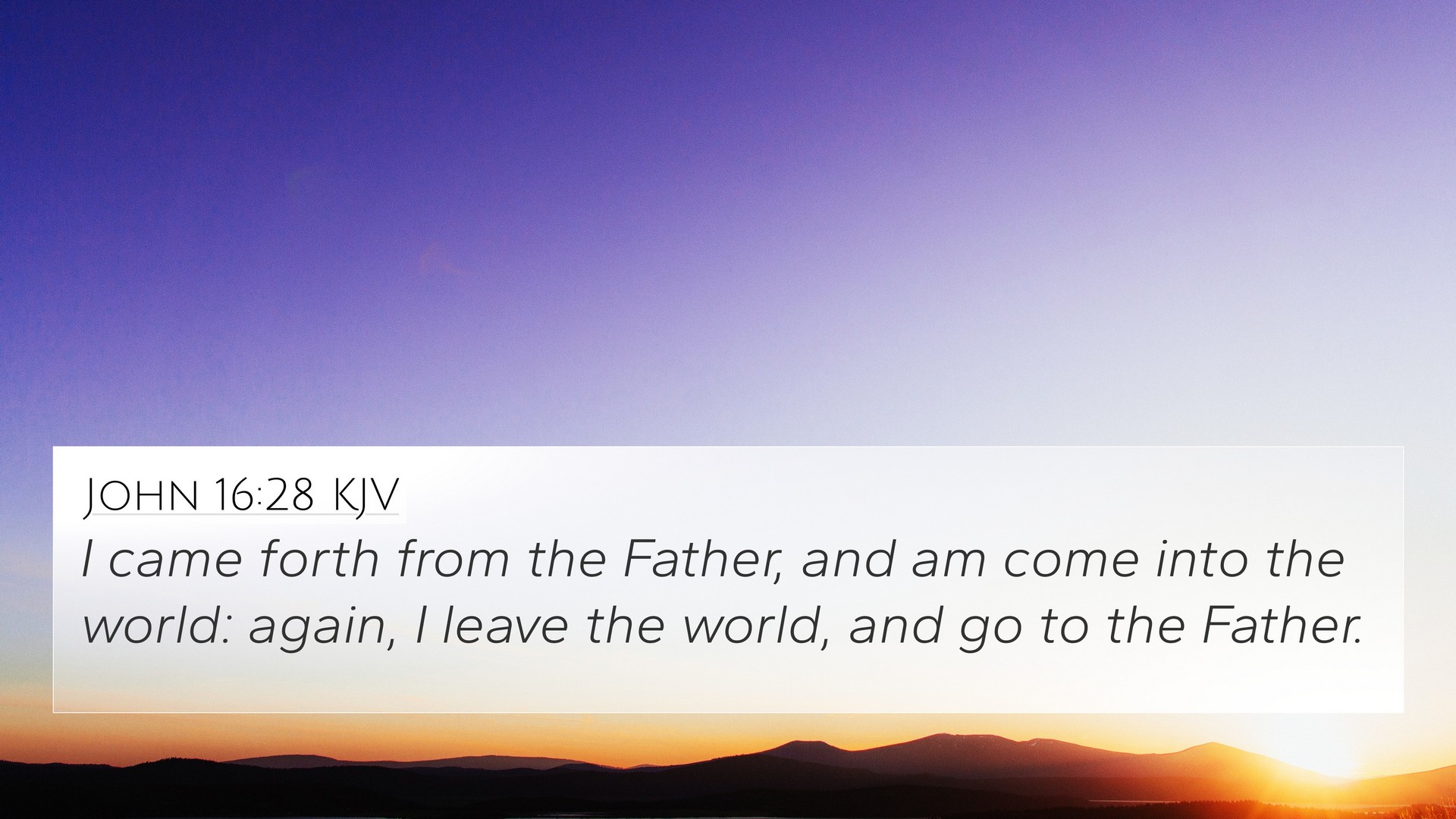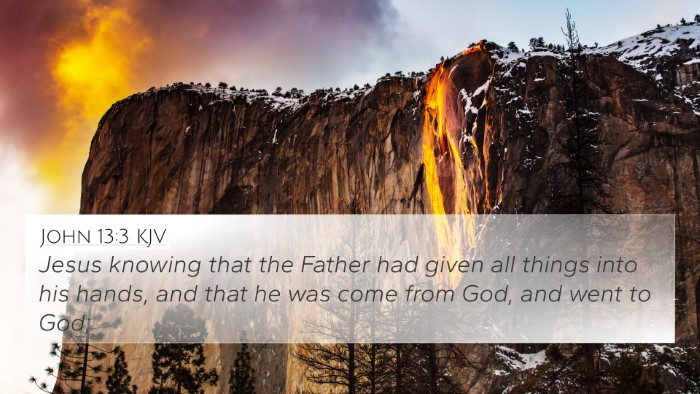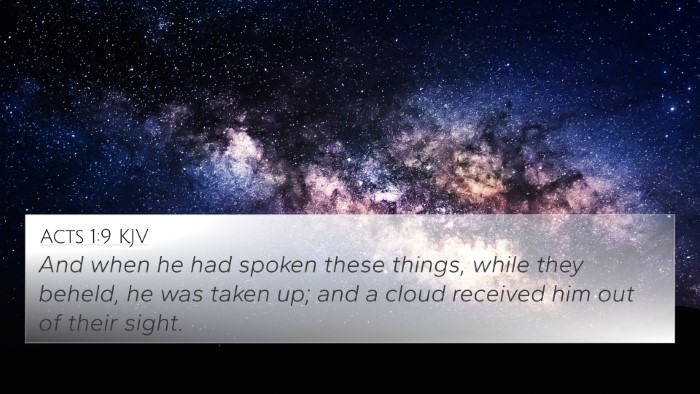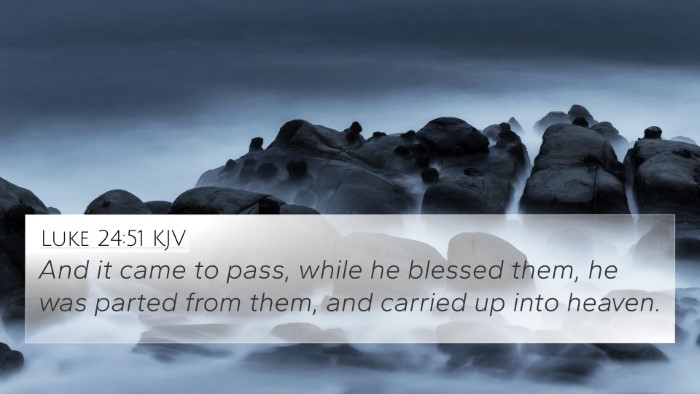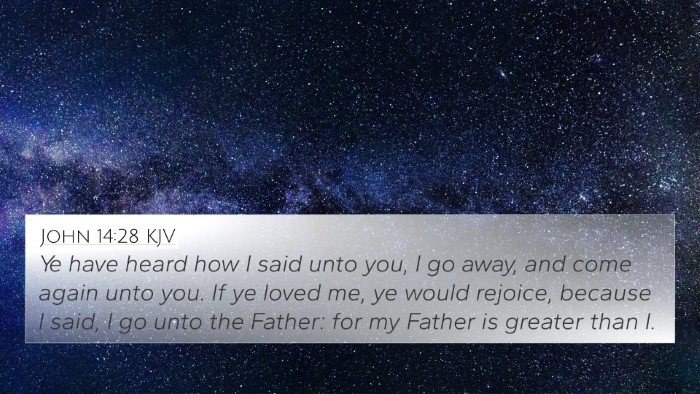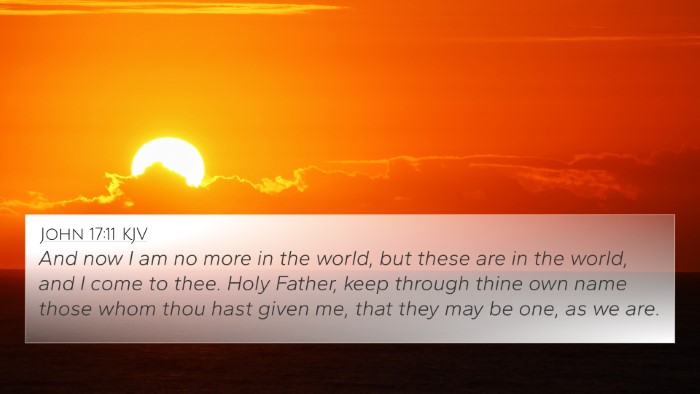Understanding John 16:28
Bible Verse: John 16:28 - "I came from the Father and have come into the world, and now I am leaving the world and going to the Father."
Summary of the Verse
This verse encapsulates the essence of Jesus' mission on earth, highlighting His divine origin, His earthly ministry, and His eventual return to the Father. Jesus indicates the journey of His existence and the purpose behind it, which is pivotal for understanding His role as the Savior of mankind.
Commentary Insights
Insights from prominent public domain commentaries shed light on this profound passage:
-
Matthew Henry:
Henry emphasizes the pre-existence of Christ, stating that He came from the Father, which affirms His divinity. His entrance into the world signifies His incarnation, where He took on human flesh to fulfill divine purposes. The phrase indicates the journey of redemption; from heaven to earth, and back to heaven.
-
Albert Barnes:
Barnes explains the theological implications of this verse, noting that it reflects a distinct understanding of Jesus' mission. His declaration about coming from the Father demonstrates His unique relationship with God, reinforcing His authority and divine mission, culminating in His return to the Father after completing His redemptive work.
-
Adam Clarke:
Clarke adds depth by connecting this verse to the broader narrative of Christ’s mission. He points out that Jesus' words provide assurance to His followers regarding His temporary stay on Earth. Clarke highlights the transition from being in this world to being rejoined with the Father, which also serves as a hope for believers in their own spiritual journeys.
Thematic Connections
John 16:28 resonates with various other Biblical themes and scriptures that enhance its understanding, including:
- John 3:13: "No one has ascended into heaven except he who descended from heaven, the Son of Man." This verse corroborates the notion of Jesus' heavenly origin and earthly mission.
- John 1:14: "And the Word became flesh and dwelt among us." This connects to the incarnation aspect of John 16:28, further illustrating Jesus' dual nature.
- Philippians 2:6-8: This passage reflects on Jesus' humility while on earth, emphasizing His obedience to the Father during His time as a servant.
- Hebrews 2:14: This verse discusses Jesus partaking in humanity, which is essential for His role as the redeemer who sympathizes with our weakness.
- Acts 1:9: "And when he had said these things, as they were looking on, he was lifted up, and a cloud took him out of their sight." This foreshadows the ascension of Jesus back to the Father.
- John 14:6: "Jesus said to him, 'I am the way, and the truth, and the life. No one comes to the Father except through me.'" This highlights the means through which believers reach the Father.
- John 17:4: "I glorified you on earth, having accomplished the work that you gave me to do." This reflects the completion of Jesus' mission on Earth, directly linking back to His statement in John 16:28.
- Romans 6:9: This verse parallels the theme of Christ's victory over death and His life at the right hand of the Father, affirming His completed work.
- Ephesians 1:20-21: Speaking of Christ’s exaltation after His ascension, affirming His position of authority and power as He returns to the Father.
- Colossians 3:1: Where believers are reminded to seek the things that are above, where Christ is seated at the right hand of God, directly emphasizing the theme of ascension seen in John 16:28.
Inter-Biblical Dialogue
This verse initiates an inter-Biblical dialogue focusing on the identity and mission of Jesus Christ and establishes fundamental principles of Christian theology, touching on:
- The divinity of Jesus, reflecting His relationship with the Father.
- The incarnation, showcasing Jesus' role in humanity.
- The promise of redemption, emphasizing the completion of Christ’s sacrifice.
- The context of His teachings, informing believers of their journey with Him.
Tools for Bible Cross-Referencing
Understanding the connections between Bible verses, such as those found in John 16:28, can be aided by:
- Bible concordance: Useful in locating specific words or phrases across various scriptures.
- Bible cross-reference guide: A valuable resource for navigating related verses thematically.
- Cross-reference Bible study: Techniques that enhance understanding of scriptural links.
- Bible chain references: This method connects verses sequentially based on themes or narratives.
- Comprehensive Bible cross-reference materials: Essential for deeper theological study and sermon preparation.
Conclusion
John 16:28 serves not only as a theological declaration about Jesus’ mission but also as a pivotal point for linking various scriptures throughout the Bible. By engaging in comparative Bible verse analysis, believers can deepen their understanding of Jesus' role in our lives and the implications of His divine departure and glorious return.
